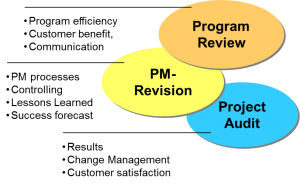Have you ever experienced disputes with one of your customers or suppliers about the status and / or settlement date of deliveries, and/or about who is responsible for the deviations from the initially planned ones? This situation actually is not very unusual, and the possible causes are as diverse as the possible developments which can result for the project, wanted or unintentional. This is where a Project Revision and Recovery (if needed) can give clarity.
A case from my professional practice:
The case which I would like to describe to you today it was about a software development project for a Portal. A contractor was to supply the portal as a subproject for a general contractor. The GC was to set up the back-end system for the customer.
Because the Back-End is a proprietary system, the portal development had to occur in the GC’s programming environment. This, however, had some flaws with regard to performance and availability, and also was incompletely documented. The subcontractor had read through and agreed on the task description, but has overlooked the fact that he was responsible for requirement assessment, the specification, and the verification of the deliverables with the customer. He also did not realize that the development environment was completely unknown to him when signing the fixed price contract. A somewhat careless risk management and lack of communication pushed everything over the top, until a milestone came up that could be neither kept nor eased.
In such a case you can imagine the resulting scenarios; in particular when the parties are stuck in mutual blaming, the customer is insisting on the deliveries and is threatening with penalties. Once the attorneys get to the table, such a project can easily topple over completely. At the very least, it then becomes ugly and expensive.
Independent expert assessment instead of remedy at courts
However, prior to practising system development through lawery, the parties had thought better of it and called me as an external “impartial” to do an audit of the project in order to achieve a safeguarded status, critical fields of action and some insight on the chances for a successful completion, on which further negotiations could be based. Note: an audit is supposed to be a matter of solutions, not of finding someone guilty!
Usually the findings are not clearly at the expense of one party, as was the case here, but the details would lead too far here. It is, however, essential, that after having come back to an objective view on the situation and identifying the real problems to be solved, we were able to draw the overall project out of the danger zone with appropriate solutions and agreements, with only minor bruising to the business cases.
 Not a solitary case as experience shows
Not a solitary case as experience shows
While in this project the Gordian knot could be broken with an objective situational analysis and some, albeit painful change requests, in other cases it is often the flood of project change requests that lead to additional costs and finally disagreement. This variant is particularly popular where enterprises or authorities, inexperienced in the project topic (for example implementation of a specific IT system), and consulting firms need to work together. These are also situations where I have been able to help by clarifying and mediating with an audit of the project, the contractual obligations and the project management processes. To an experienced and independent Project Management Professional the pitfalls and weaknesses are quickly recognised, and he can contribute to a solution and to lasting preventions.
Preventionand continuous improvement
Smart companies, however, do not wait for crisis situations to be driven to ask for external help. They practise a pro-active risk management and regular project audits. With the regular measurement of project performance against the project goals and the frequent inspection of the application of appropriate PM methods, tools and corresponding rules an impressive project quality assurance can easily be performed, which quickly translates to strategic advantages such as customer and employee satisfaction. If the resources or specialists really should be missing for this purpose, it’s still time to call for (temporary) external help…
Read more about this topic – click here …

Very true. Every experienced project manager will recognize this situation. And it would cost less to do it right from the first time instead of having to bring a project back on track.